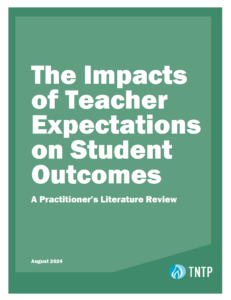Today, Arne Duncan appeared with DC Public Schools Chancellor Kaya Henderson to announce that the Department of Education will entertain delays in state plans to factor student learning into teacher evaluations, at least during the introduction of new assessments. As people who have long argued for urgency in making student growth a bigger consideration in evaluations, this pricked up our ears. Here are four things we take away from the announcement:
- This is not a retreat from the general notion that students’ academic growth should inform assessments of teacher performance. The delays are going to be temporary. (In our view, they should apply only to the 2014-15 school year, when new assessments arrive. Once there is a baseline and educators have had exposure to the new tests, we ought to move forward.) But in any event, the Department plans to insist that states calculate growth for teachers and communicate those results to teachers even if the results are not used for evaluations.
- A delay is less problematic in some places than others. DC Public Schools, for instance, has a robust evaluation system that does a good job of distinguishing levels of classroom performance whether you include student growth or not. A pause in placing weight on student growth isn’t going to result in a pause on teachers receiving meaningful feedback or facing high standards for their instruction. However, in most states—particularly those struggling to foster honest ratings and feedback—slowing down is merely an off-ramp to nowhere. States in that position shouldn’t seek a delay.
- Let’s hope states that receive a reprieve don’t take a nap. Too often, delays mean little more than kicking the can down the road. That can’t be the case here, because there is a ton of work to be done on teacher evaluation systems. Early adopter states have struggled with data integrity, inflated scores, and bias in classroom observations. We need to get this work right. Evaluation is a quest for teaching excellence through careful collection and consideration of high quality information. It’s not a quest for a few bad teachers. But it will become the latter if states don’t commit to improving all elements of evaluation, not just student growth. Consider the recent debacle in New York where Governor Cuomo, at the union’s urging, agreed to withhold improvement plans for teachers with the lowest student growth on state assessments. Bad idea.
- This announcement could have been timed better. Both national unions have been calling for delays of this sort for at least a year. Over time, their positions seem to have evolved from cautious acceptance of student growth as one measure of teacher performance to loud opposition. It’s increasingly clear that they do not intend to be partners in modernizing evaluation. The unions have also rattled their sabers against Secretary Duncan, calling for his resignation at their summer conventions. By making this policy announcement now, it will look to many that Duncan is trying to appease his union critics. I actually doubt that is the case. He can’t be in the mood to hand them victories after their recent actions. Plus, he announced his intent to move in this direction before the union votes. But if he was going to offer relief to states on the pace of implementing new evaluations, it sure seems like that relief could have come earlier.








